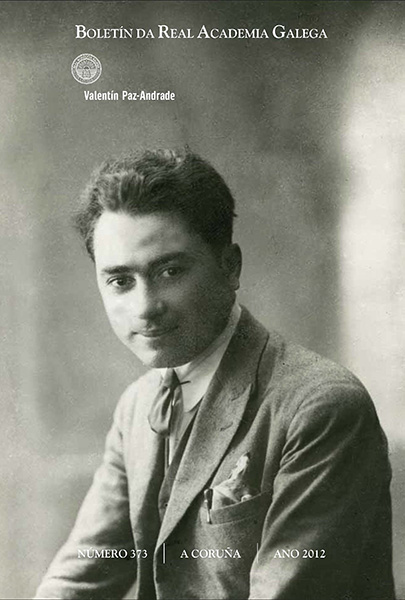O Valle-Inclán de Valentín Paz-Andrade
Descargas
Publicado
Cómo citar
Número
Sección
DOI:
https://doi.org/10.32766/brag.373.413Palabras clave:
Rexurdimento, Sincretismo idiomático, Palimpsesto, Materia de Galicia, Esperpento, GaleguidadeResumo
En 1966 Valentín Paz-Andrade é convidado ás Xornadas Galegas de Bos Aires e os promotores do Centro galego suxiren que aborde a efeméride do centenario do nacemento de Ramón del Valle-Inclán. O ano seguinte ao libro derivado daquelas conferencias, La anunciación de Valle-Inclán, oferta unha visión reivindicadora da galeguidade de Valle-Inclán que non se aparta, no sustantivo, da que Castelao deixará formulada pouco despois do pasamento de don Ramón nunha conferencia lida en L’A Habana en xaneiro de 1939, e titulada Galicia y Valle-Inclán.
A meirande tese do libro consiste no vencellamento de Valle-Inclán co rexurdimento das artes e letras en Galicia que xermolaba xa dende pouco antes do seu nacemento en 1866. A esta reconstrución entre biográfica e histórico-cultural dos comezos valleinclanianos, Paz-Andrade engade tres dimensións máis especificamente referidas á estética e á análise literaria: a primeira consiste no que nomea con acerto “a materia de Galicia”; igualmente, está a pegada estética galega do esperpento valleinclaniano; e finalmente, un asunto controvertido, o denominado polo crítico “proceso de recastamiento lingüístico”. O “sincretismo idiomático” de Valle-Inclán ten que ver cunha sorte de funcionamento en literatura dunha lingua como substrato doutra, a modo de palimpsesto.
Descargas
Citas
Calvo, Tucho (2011): Valentín Paz-Andrade, a memoria do século XX. A Coruña: Biblos Clube de Lectores. Segunda edición.
Eagleton, Terry (1996): The Function of Criticism. Londres.
Esteban, José (1973): Valle-Inclán visto por... Madrid: Las Ediciones de El Espejo.
Paz-Andrade, Valentín (1967): La anunciación de Valle-Inclán, Buenos Aires: Losada. Prólogo de Eduardo Blanco Amor. Segunda edición ampliada, Madrid: Akal Editor, 1981.
Paz-Andrade, Valentín (1978): A galecidade na obra de Guimarães Rosa. Sada: Ediciós do Castro.
Paz-Andrade, Valentín (1982): Castelao na luz e na sombra. Sada: Ediciós do Castro.
Rodríguez Castelao, Alfonso (1971): Galicia y Valle-Inclán. Lugo: Ediciones Celta.
Paz-Andrade, Valentín (1993): Cadernos (1938-1948). Escolma. Vigo: Editorial Galaxia. Edición de I. Cochón, F. Dubert, A. Mato e H. Monteagudo.
Sender, Ramón J (1965): Valle-Inclán y la dificultad de la tragedia. Madrid: Editorial Gredos.
Valle-Inclán, Ramón del (1971): Galicia y Valle-Inclán. Lugo: Ediciones Celta.
Valle-Inclán, Ramón del (1987): Artículos completos y otras páginas olvidadas. Madrid: Ediciones Istmo. Ed. Javier Serrano Alonso.
Valle-Inclán, Ramón del (1994): Entrevistas, conferencias y cartas. Valencia: Editorial Pre-Textos. Edición de Joaquín e Javier del Valle-Inclán.
Valle-Inclán, Ramón del (2002): Obra Completa. Tomos I e II. Madrid: Editorial Espasa-Calpe.
Villanueva, Darío (2007): Da palabra no tempo. Estudos e ensaios de literatura. A Coruña: Edicións Espiral Maior.
Yeats, W. B. (1989): “Per amica silentia lunae”, en Mythologies. Chippenham: The MacMillan Press.
Yeats, W. B. (1994): The Celtic Twilight. Myth, Fantasy and Folklore. Bridport: Prims Unity.
Yeats, W. B. (2001): “The Celtic Element in Literature”, en The Major Works. Oxford: Oxford University Press. Ed. Edward Larrissy.
Zahareas, Anthony N., Rodolfo Cardona e Sumner Greenfield (compiladores) (1968): Ramón del Valle-Inclán. An Appraisal of his Life and Works. New York: Las Américas.











